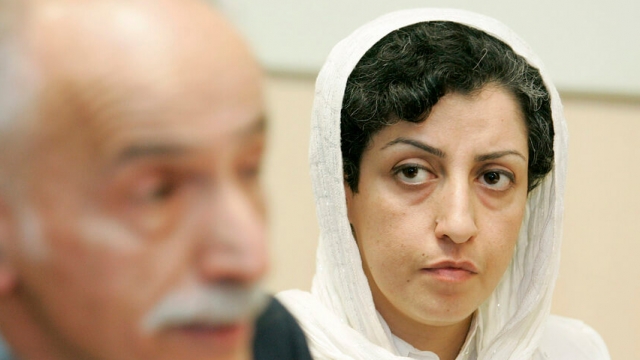For only the 19th time in the 122-year history of the Nobel Prize, the Peace Prize has gone to a woman.
Imprisoned Iranian activist Narges Mohammadi was honored with the Nobel Peace Prize in recognition of her fight against women's oppression, advocacy for democracy, and firm opposition to the death penalty in Iran over the course of three decades.
Despite enduring numerous arrests and currently being behind bars, the 51-year-old activist has remained determined in her commitment to fight for human and civil rights in her home country.
The chair of the Norwegian Nobel Committee, Berit Reiss-Andersen, made the announcement in Oslo on Friday, emphasizing that the award is for the collective efforts of a larger movement in Iran.
“This prize is first and foremost a recognition of the very important work of a whole movement in Iran with its undisputed leader, Nargis Mohammadi," said Reiss-Andersen.
Throughout most of Mohammadi's life, Iran has been under the governance of a Shiite theocracy led by the country’s Supreme Leader, Ayatollah Ali Khamenei. The supreme leader has full control over security agencies and constantly imposes laws against Western influences and ideas, mostly those relating to women, feminism and sexuality. Violation of these laws can oftentimes result in arrests and the death penalty.
In her role as the vice president of the Defenders of Human Rights Center in Iran, Mohammadi has always advocated for the end of the death penalty.
This announcement comes a year after Iran faced significant unrest with nationwide protests ignited by Mahsa Amini's death on Sept. 16, 2022, while in police custody.
Even though the protests were meant to be peaceful, officers employed lethal force against protesters, predominantly women and youths, chanting “Women, Life, Freedom” and “Death to the Dictator” against the regime. By the end of the year, over 500 people, including 69 children, were killed, and 19,000 protesters, including children, were arrested, according to the U.S. Bureau of Democracy, Human Rights, and Labor.
“What the government may not understand is that the more of us they lock up, the stronger we become,” Mohammadi told the New York Times last month. “I started campaigning in Iran 32 years ago, as a student. My goal back then was to fight religious tyranny, which, along with tradition and social customs, has led to the deep repression of women in this country. That’s still my goal.”
Mohammadi has been detained by the Iranian regime 13 times, convicted five times, and given a sentence of 31 years in prison and 154 lashes, according toThe Nobel Prize.
This also marks the fifth time in the 122-year history of the awards that the Peace Prize has been awarded to an individual currently imprisoned.
Reiss-Andersen is urging the Iranian government to allow Mohammadi to personally receive the prize at the December ceremony in Oslo.
Additional reporting by The Associated Press.
SEE MORE: 2 scientists who helped create mRNA vaccines to fight COVID win Nobel
Trending stories at Scrippsnews.com



